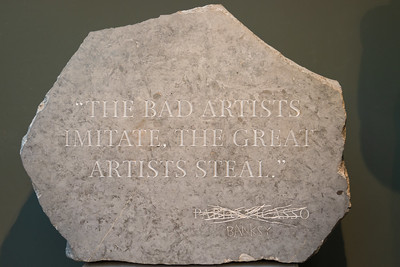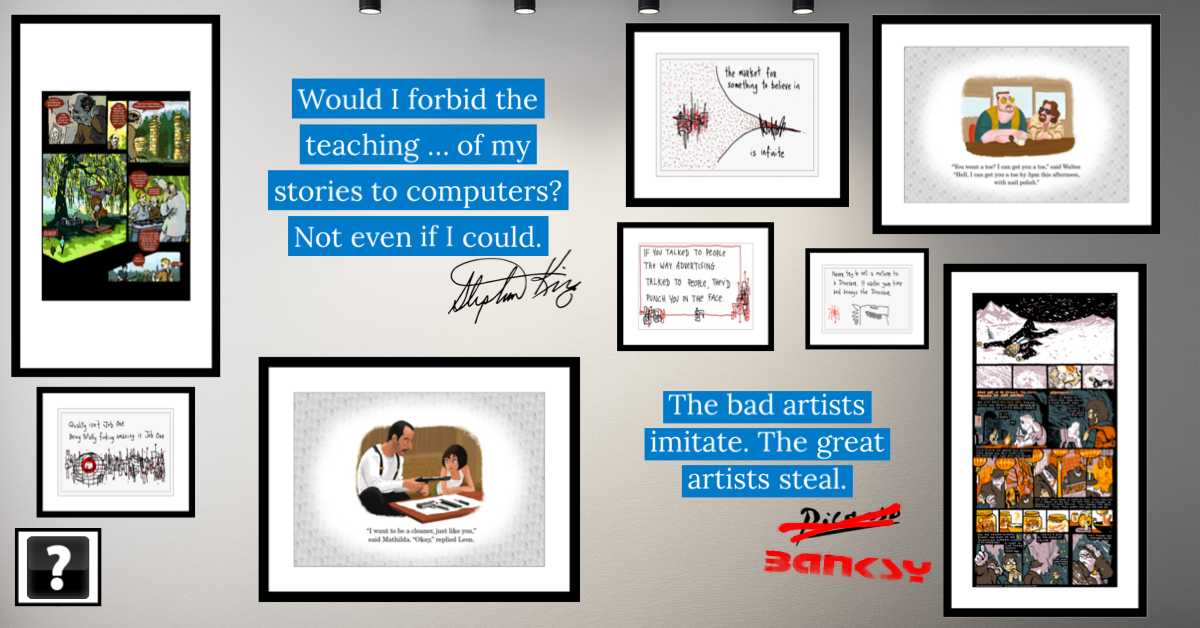Would I forbid the teaching (if that is the word) of my stories to computers? Not even if I could. I might as well be King Canute, forbidding the tide to come in. Or a Luddite trying to stop industrial progress by hammering a steam loom to pieces.
Stephen King, from Stephen King: My Books Were Used to Train AI [theatlantic.com] published by The Atlantic.
I read that back in August and it’s stuck with me. I’ve had several conversations about this topic with various people. There are a lot of people out there who are railing against the use of their work in training AI. Screaming everything from plagiarism to copyright infrengement.
On the one hand I can understand the fear and anger. If you spend your time to create something and you hope to make your living from that creation and subsequent creations that may depend on consumers liking your style… then the idea that your style can be mimicked, cheaply and quickly, by an AI is an existential threat.
But, here’s the thing. Is an silicon-and-copper AI, trained on the works of any artist, living or dead, copyrighted material or not, and then asked to mimic the style of said artist, any different than a flesh-and-blood artist who spends time studying the works of another artist to mimic the style because they like it or because people will buy works in that style? I’m not sure I see a significant difference.
I remember spending hours in the art museums in DC and London and seeing artists sitting there with their notebooks or, sometimes, even an easel setup copying the works. They would sketch or paint in full or in part, a copy of a work hanging in the museum. They were literally copying the work of another artist. I assume they were learning.
Of course these studies can’t be sold, I guess, if the original work is still in copyright. If the original work is out of copyright, in the public domain, the then anyone can sell a copy. There is a whole industry creating copies of famous paintings, as accurately as possible, to sell to people (or companies) who want a copy. Check out this story about the village in China that turns out endless copies of famous paintings: On the Ground: Van Gogh lives here. So does Rembrandt. A Chinese village where the great masters live on (in replication) [latimes.com]. But copies for selling aren’t my point; copying for the sake of learning, of training the artist to be able to reproduce the style or incorporate the style into their own works is the point.
There is a whole industry of artist out there creating works that are “in the style of”. See this story on the work or a Disney artist who did Star Wars in the style of Calvin and Hobbes [theverge.com], I love it, I love both Star Wars and Calvin and Hobbes and as this falls under the rules I parody, I’m total down to buy a tee shirt of this. Or, go search Etsy, Redbubble, or DeviantArt for “Calvin and Hobbes” for examples of artists drawing the famous duo in all manner of styles. Or search DeviantArt for “Studio Ghibli” and see the plethora of works that are either characters or scenes from Studio Ghibli works done in other styles or the works of others done in the style of Ghibli Studio.
If our art is popular people on the internet are going to mimic it. And a lot of them are going to sell it.
All of this is to say that training an artist —a physical human or a digital AI— on existing art is fine. Copyright rules are supposed to protect the ability of the original artist to make a living while allowing others to produce derivative works (copyright has many issues, including abuse by individuals and corporations to stifle legitimate derivative works just because they have the money to hire better lawyers, but that is beyond the scope of this post, my point is there is a system). If I ask an AI to write me a story in the style of Steven King and it is not literally reproducing large swaths of text from King’s works then how is that different from anyone inspired by Steven King writing stories? Remember what Picasso Bansky said: Good artists copy. Great artists steal.

I recently saw a post of AI created “Disney Princesses in the style of Studio Ghibli” making the rounds on social media. That’s an old trope, what’s new is that they did it with AI, the output was good, and they used that output to create a YouTube video, with AI voice over, that they could post and make money on ads.
And I think his issue of not paying someone to create the art, but going cheap on an AI so that they can make more profit by pushing out more content to social media is the real issue. In the end the issue is that commerce trumps creativity; and if you are trying to make a living from your creativity commerce and the AI is going to destroy you.
The ease and speed with which the AI can pump out the Disney-Ghibli princesses means more profit for the person who posts the video than if they had to pay an actual artist to do the work. It’s the age old issue of capitalism valuing art only in so far as it makes money. Profitability trumps artistic vision. Nothing new there. Artists will need to adapt, it’s never been an easy living, and throwing their sabots at the AIs won’t stop it.
The more industry is able to use AI to replace actual human creativity the more our culture will suffer. Art, in all its forms, more than anything else is what makes us human. Since the first humans pressed their hands to a rock and spit ochre to leave their mark art has been a defining characteristic of humanity. It would be a great pity if the AI drove human artists to extinction.
I have purchased a fair bit of actual art from internet artists over the years. I have a cabinet full of posters, books and figurines by various creators: A Lesson is Learned by the Damage is Irreversible [alessonislearned.com], Josh Cooley and Gaping Void [gapingvoid.com] (which the artist seems to have turned into a successful consulting business, but they were selling prints of their art back in 2010), Art from these three is in the featured image of this post, as long ago I downloaded images of what I bought to create a layout for my wall, but I never got them up. I’ve also supported Dresden Codak [dresdencodak.com], Little Gamers [little-gamers.com], CHAKAL666, Steve Bailik, and many more. Most seem to be offline these days. I wish I had room to display all the art I have, but most of it is in a boxes or poster tubes.
Would I buy AI art? I don’t know, right now I don’t see anything that I think is so amazing and honestly the money is going to who? Most AI art seems to be clickbait. Prompt engineering is a skill, just go and take a look at the prompts that are being used to generate images with Midjourny or Dall-E. The people generating good AI art are working at it, though it might not be compariable to the work of an artists who spent years developing the muscle memory and eye for painting.
Anyway, support culture, support artists. Buy art from people. But, avoid things that are obvious copyright violations. Parody is your friend.

